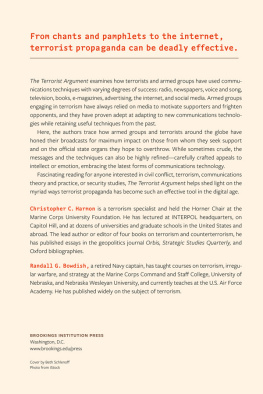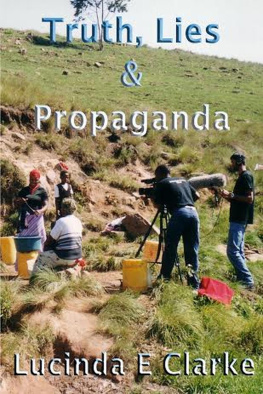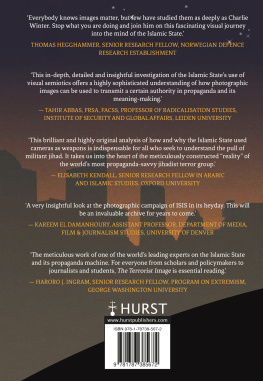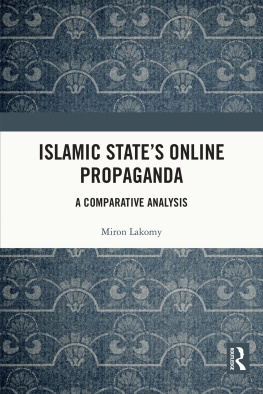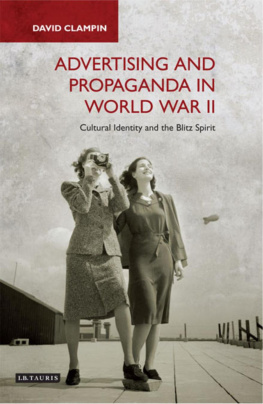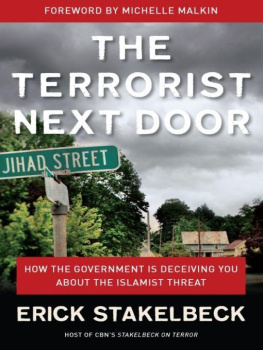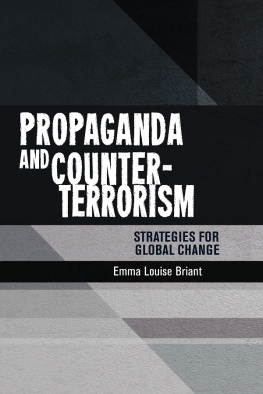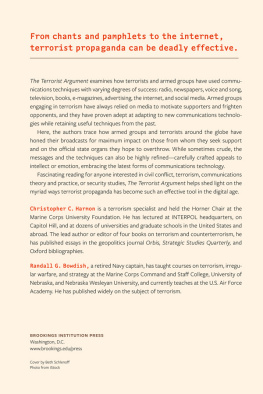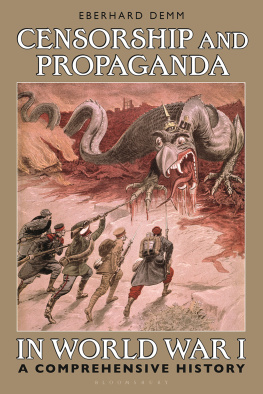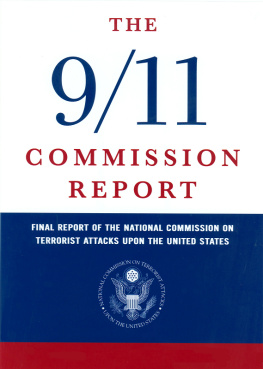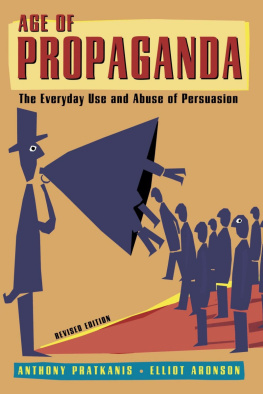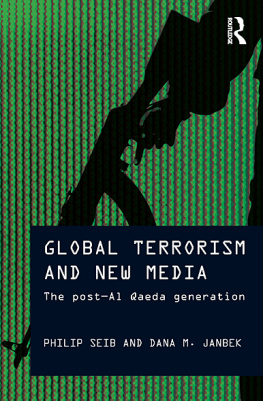The Terrorist Argument
MODERN ADVOCACY and PROPAGANDA
Christopher C. Harmon
Randall G. Bowdish
BROOKINGS INSTITUTION PRESS
Washington, D.C.
Copyright 2018
THE BROOKINGS INSTITUTION
1775 Massachusetts Avenue, N.W., Washington, D.C. 20036
www.brookings.edu
All rights reserved. No part of this publication may be reproduced or transmitted in any form or by any means without permission in writing from the Brookings Institution Press.
The Brookings Institution is a private nonprofit organization devoted to research, education, and publication on important issues of domestic and foreign policy. Its principal purpose is to bring the highest quality independent research and analysis to bear on current and emerging policy problems. Interpretations or conclusions in Brookings publications should be understood to be solely those of the authors.
Library of Congress Cataloging-in-Publication data are available.
ISBN 978-0-8157-3218-1 (pbk : alk. paper)
ISBN 978-0-8157-3219-8 (ebook)
9 8 7 6 5 4 3 2 1
Typeset in Adobe Garamond Pro
Composition by Westchester Publishing Services
To the teachers and mentors
including Congressmen Ike Skelton and Jim Courter
who showed us decency and reason in politics
For Marine Corps University and its Foundation
which brought our minds together
Finally, for Kate
You are missed
Contents
Introduction
O ne of al-Qaedas editors, the youthful American Samir Khan, once wrote a valuable essay, The Media Conflict, which opened with this anecdote from his life with the group in Yemen, headquarters of his group al-Qaeda in the Arabian Peninsula. Khan was at work in the office of their electronic magazine, Inspire. An arriving important visitor, named as Shaykh Abu Basir, looked about the office and said to the mujahideen at work at computers: The media work is half of the jihad. Khan recognized both the truth in the statement and the quotation itselffrom Osama bin Laden. Khans article continues, Just then a brother intervened and confirmed, A powerful media production is as hard hitting as an operation in America.
Well before this epiphany in 2009, other terrorists just as earnest, some of them leaders of large or successful media teams, had had similar insights. Even though Inspire has now seen the deaths of its two famous American-born editors, Samir Khan and Anwar al-Awlaki, there will always be other terrorist editors, and other ideologists, to take up the intellectual cudgels and fire rhetorical bullets to punctuate their arguments. Action and public argument are intimately related in modern terrorism. Violence delivers a message as propaganda of the deed, with fear of more violence to come providing an impetus to attend to propaganda of the word. The connection between propaganda of the word and of the deed has long been studied; what we add is an understanding of terrorist messages in the context of the mediums used to propagate them.
Nine media and propaganda campaigns are studied here. Some show more success than others for substate actors and perpetrators. Some are shorter, or longer, in their expanse of years. It goes without saying that each campaign is unique in vital respectsjust as human personalities differ within the same terror cell.
The book deals closely with terrorism and insurgency. Terrorism was defined well in 1979 by the Jonathan Institute, a Tel Aviv think tank, as the deliberate and systematic murder, maiming, and menacing of the innocent to inspire fear for political ends. In line with our previous work, which is in accord with the great scholar Paul Wilkinson (19372011), we treat terrorists and insurgents together when appropriate. Insurgency is a broad-based effort using violence and politics to create popular support to effect political change or revolution in governance. Whether insurgents decide to also employ terrora shock weapon used against the innocent to inspire wider fears and allow changeis a matter of strategic choice. In fact, more often than not insurgents do deploy terrorism. So although it is quite possible to fight a guerrilla war against military targets while making a related political drive, and thus to meet a definition of legitimate insurgency, the groups analyzed in this volume all at some point have included terrorism in their arsenals, or advocated its use.
Terrorism is immoral and contrary to both traditional and modern international law. Each of the nine case studies reflects that theoretical stance of the authors. Other analysts will continue the legitimate debate over definitions; for us it is a good beginning here to observe that the Algerian National Liberation Front, the Irish Republican Army Provisionals, the Filipino New Peoples Army, and the Islamic State in Iraq and Syria were all clearly insurgencies during the campaigns studied and they also all made calculated use of terrorism.
Consider the Algerian National Liberation Front, and the number of books on terrorism which begin with that insurgency. In this essay, however, we focus on a now-forgotten radio campaign of 1956 through 1962 that was as revolutionary as its perpetrators politics.
The New Peoples Army is next: Filipinos of the fighting Communist Party have drafted multiple forms of media, but they lead their campaign of persuasion today as always with speech and song .
A case study combining contemporary ethnic politics, diaspora dramas, and good old-fashioned newspaper print covers The Irish People , a New York weekly, in the latter 1990san important period during a longer press run. In its way, the paper politely fronted for the IRA Provos.
Hezbollahs television station Al-Manar, which it has run since 1991, now a quarter century old, is doing much to help the group maintain its position in Lebanese politics and to communicate radical Shia aspirations for some outside audiences.
Next we consider the American eco-warriors who combined terrorist tactics with moralism and cerebral rhetorical appeals, posting the combinations on their violent websites. This campaign that stretched far beyond legitimate activism peaked about year 2000, yet the hot red fringe of the green movement engendered further incidents during the following decade.
The book is rarely considered a terrorist medium, but scores of terrorists have written autobiographies or propaganda volumes. A most important oneperhaps the most important in the history of terrorist literatureemerged in 2004 and 2005: The Call to Global Islamic Resistance , by Abu Musab al-Suri. Although al-Suri has not commercially published an English version of his text, partial translations are available. A book of policy, strategy, and tactics, The Call continues to be a veritable guide for many terrorists today and thus demands our understanding.
The advertising campaign of the Iranian dissidents of Peoples Mujahideen e Khalq comes next: they have used many media in their protracted history of militancy, but their big-buy newspaper ads of 2005 through 2012 are exemplary as an influence operation aimed at Western governments.
A pair of final studies show terrorist groups doing revolutionary and successful things in media and strategic communications, even though neither is winning its larger war. Al-Qaeda in the Arabian Peninsula set a standard for electronic warfare in the realm of ideas, so we carefully page through all sixteen issues (20102016) of its e-magazine, Inspire .
Once part of al-Qaeda, yet then breaking away in 2013, the Islamic State of Iraq and Syria mastered the newer social media , a psychological form of wounding and maiming that most analysts will always pair with ISIS killing actions. Their campaign of 201417 rounds out our study of terrorists use of communications media.
The order of our case study chapters is generally chronological, which will meet the expectation of many readers. Yet chronologyof terrorism, and of the evolution of its technical communications meansproves surprisingly unimportant, when these studies are taken together. Technologys revolutions do indeed come ever faster in our time, but human beings change more slowly, more deliberately; they like variety, and sometimes they prefer older technologies for their newest purposes. ISIS has astonished us on Twitter, but it has also run a radio station, as did Algerias National Liberation Front in the late 1950s. The newspaper may be several centuries old, but even as Algerian FLN propagandists waged their highly original and successful campaign on radio waves, they also disseminated their ideas via a densely written, thoughtful, Le Monde look-alike newspaper, printed on underground presses. Television may seem the best mass-market tool of contemporary influence, but when the wealthy Iranian dissidents of Peoples Mujahideen e Khalq battled to have their group removed from Western nations lists of terrorist organizations, they chose the low-tech paid advertisement in foreign newspapers as the place to invest, meanwhile continuing to employ other media they liked and usedfor example, satellite broadcasts.
Next page
